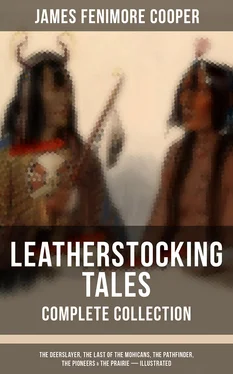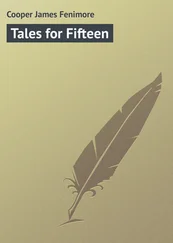It is related that, in 1832, while he was at Paris, an article was shown him in an American newspaper, purporting to be a criticism on one of his works, but reflecting with much asperity on his personal character. “I care nothing,” he is reported to have said, “for the criticism, but I am not indifferent to the slander. If these attacks on my character should be kept up five years after my return to America, I shall resort to the New York courts for protection.” He gave the newspaper press of this state the full period of forbearance on which he had fixed, but finding that forbearance seemed to encourage assault, he sought redress in the courts of law.
When these litigations were first begun, I recollect it seemed to me that Cooper had taken a step which would give him a great deal of trouble, and effect but little good. I said to myself—
“Alas! Leviathan is not so tamed!”
As he proceeded, however, I saw that he had understood the matter better than I. He put a hook into the nose of this huge monster, wallowing in his inky pool and bespattering the passers-by; he dragged him to the land and made him tractable. One suit followed another; one editor was sued, I think half-a-dozen times; some of them found themselves under a second indictment before the first was tried. In vindicating himself to his reader, against the charge of publishing one libel, the angry journalist often floundered into another. The occasions of these prosecutions seem to have been always carefully considered, for Cooper was almost uniformly successful in obtaining verdicts. In a letter of his, written in February, 1843, about five years, I think, from the commencement of the first prosecutions, he says, “I have beaten every man I have sued, who has not retracted his libels.”
In one of these suits, commenced against the late William L. Stone of the Commercial Advertiser , and referred to the arbitration of three distinguished lawyers, he argued himself the question of the authenticity of his account of the battle of Lake Erie, which was the matter in dispute. I listened to his opening; it was clear, skilful, and persuasive, but his closing argument was said to be splendidly eloquent. “I have heard nothing like it,” said a barrister to me, “since the days of Emmet.”
Cooper behaved liberally towards his antagonists, so far as pecuniary damages were concerned, though some of them wholly escaped their payment by bankruptcy. After, I believe, about, six years of litigation, the newspaper press gradually subsided into a pacific disposition towards its adversary, and the contest closed with the account of pecuniary profit and loss, so far as he was concerned, nearly balanced. The occasion of these suits was far from honorable to those who provoked them, but the result was I had almost said, creditable to all parties; to him, as the courageous prosecutor, to the administration of justice in this country, and to the docility of the newspaper press, which he had disciplined into good manners.
It was while he was in the midst of these litigations, that he published, in 1840, the Pathfinder . People had begun to think of him as a controversialist, acute, keen, and persevering, occupied with his personal wrongs and schemes of attack and defence. They were startled from this estimate of his character by the moral duty of that glorious work—I must so call it; by the vividness and force of its delineations, by the unspoiled love of nature apparent in every page, and by the fresh and warm emotions which everywhere gave life to the narrative and the dialogue. Cooper was now in his fifty-first year, but nothing which he had produced in the earlier part of his literary life was written with so much of what might seem the generous fervor of youth, or showed the faculty of invention in higher vigor. I recollect that near the time of its appearance I was informed of an observation made upon it by one highly distinguished in the literature of our country and of the age, between whom and the author an unhappy coolness had for some years existed. As he finished the reading of the Pathfinder, he exclaimed, “They may say what they will of Cooper; the man who wrote this book is not only a great man, but a good man.”
The readers of the Pathfinder were quickly reconciled to the fourth appearance of Leatherstocking, when they saw him made to act a different part from any which the author had hitherto assigned him—when they saw him shown as a lover, and placed in the midst of associations which invested his character with a higher and more affecting heroism. In this work are two female characters, portrayed in a masterly manner,—the corporal’s daughter, Mabel Dunham, generous, resolute, yet womanly, and the young Indian woman, called by her tribe the Dew of June, a personification of female truth, affection, and sympathy, with a strong aboriginal cast, yet a product of nature as bright and pure as that from which she is named.
Mercedes of Castile , published near the close of the same year, has none of the stronger characteristics of Cooper’s genius; but in the Deerslayer , which appeared in 1841, another of his Leatherstocking tales, he gave us a work rivalling the Pathfinder. Leatherstocking is brought before us in his early youth, in the first exercise of that keen sagacity which is blended so harmoniously with a simple and ingenuous goodness. The two daughters of the retired freebooter dwelling on the Otsego lake, inspire scarcely less interest than the principal personage; Judith, in the pride of her beauty and intellect, her good impulses contending with a fatal love of admiration, holding us fascinated with a constant interest in her fate, which, with consummate skill, we are permitted rather to conjecture than to know; and Hetty, scarcely less beautiful in person, weak-minded, but wise in the midst, of that weakness beyond the wisdom of the loftiest intellect, through the power of conscience and religion. The character of Hetty would have been a hazardous experiment in feebler hands, but in his it was admirably successful.
The Two Admirals and Wing-and-Wing were given to the public in 1842, both of them taking a high rank among Cooper’s sea-tales. The first of these is a sort of naval epic in prose; the flight and chase of armed vessels hold us in breathless suspense, and the sea-fights are described with a terrible power. In the later sea-tales of Cooper, it seems to me that the mastery with which he makes his grand processions of events pass before the mind’s eye is even greater than in his earlier. The next year he published the Wyandotte or Hutted Knoll , one of his beautiful romances of the woods, and in 1844 two more of his sea-stories, Afloat and Ashore and Miles Wallingford its sequel. The long series of his nautical tales was closed by Jack Tier or the Florida Reef, published in 1848, when Cooper was in his sixtieth year, and it is as full of spirit, energy, invention, life-like presentation of objects and events—
The vision and the faculty divine—
as anything he has written.
Let me pause here to say that Cooper, though not a manufacturer of verse, was in the highest sense of the word a poet; his imagination wrought nobly and grandly, and imposed its creations on the mind of the reader for realities. With him there was no withering, or decline, or disuse of the poetic faculty; as he stepped downwards from the zenith of life, no shadow or chill came over it; it was like the year of some genial climates, a perpetual season of verdure, bloom, and fruitfulness. As these works came out, I was rejoiced to see that he was unspoiled by the controversies in which he had allowed, himself to become engaged; that they had not given to these better expressions of his genius, any tinge of misanthropy, or appearance of contracting and closing sympathies any trace of an interest in his fellow-beings less large and free than in his earlier works.
Читать дальше












